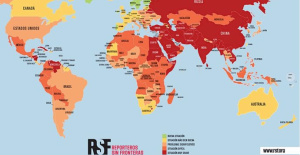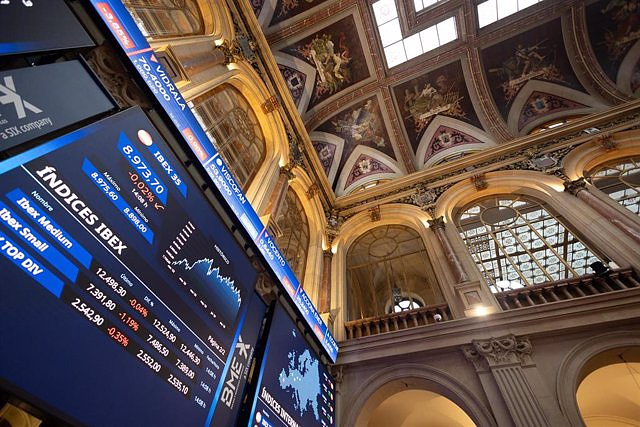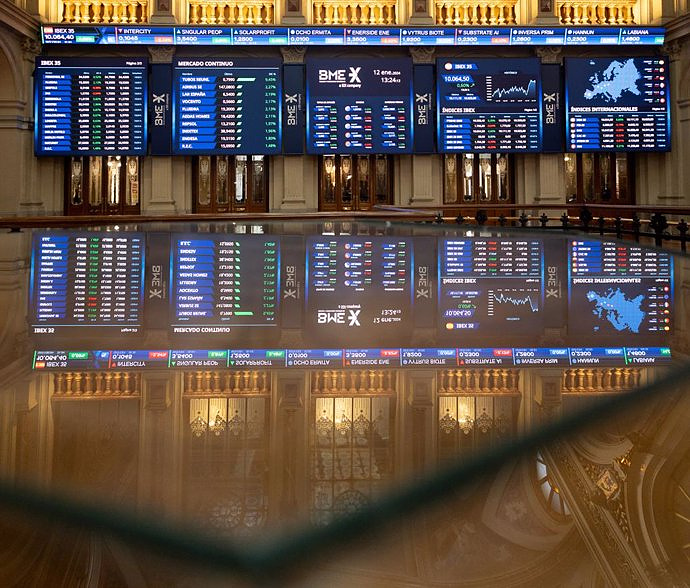The wealth of the five richest men in the world has grown by 114% since 2020, to 793,818 million euros
MADRID, 15 Ene. (EUROPA PRESS) -
Oxfam Intermón has denounced this Monday that 53.8% of the value of wealth in Spain was concentrated in 2022 in the hands of 10% of the population, and 22.4%, in those of the richest 1%, while The 50% of the poorest households barely accounted for 7.8% of the national total and saw their average net wealth reduced, as stated by the NGO in its report 'Desigualdad S.A., Subsidiary in Spain'.
The document highlights that, in the last 20 years, the gap between a family in the poorest 50% and another in the wealthiest 10% has doubled. These dynamics would have occurred, the organization explains, due to the growing percentage of the Gross Domestic Product (GDP) represented by capital income, concentrated in a few people, compared to labor income.
To this trend we must add the evolution of financial wealth, since the weight of financial assets over gross wealth has almost doubled over the last 20 years, and 79.2% of their value is in the hands of the 10% of the wealthiest people.
Among these, Oxfam Intermón has indicated that nearly half of the 50 large Spanish companies have a "significant" connection with the wealthiest 1% through ownership of said companies or through their presence in their management bodies, which " exacerbates inequality."
The document states that there is a "broad concentration" in some sectors, as in the case of the electricity sector, with Iberdrola, Endesa, Naturgy and Repsol accounting for 86.1% of the market share. Repsol and Cepsa alone have 4,800 service stations, almost half of the national distribution of fossil fuels. Similarly, only Santander, BBVA and Caixabank accounted for 63% of banking assets.
These concentrations would take the form of "behavior contrary to the interests of the majority" due to price manipulation, anti-competitive practices or, in the case of financial entities, the refusal to remunerate deposits in line with the rise in interest rates of the European Central Bank (ECB). The only beneficiaries would be the shareholders and senior executives of the companies, whom Oxfam Intermón describes as a "privileged minority."
"The data shows us a disproportionate distribution with energy companies and banks registering growing profits, translated into million-dollar compensation to shareholders and senior executives, while 14 million people in our country see how their mortgage costs have increased and 17.1% of people couldn't afford to keep their houses warm," said the general director of Oxfam Intermón, Franc Cortada.
Despite the 16% increase in profits, these large companies barely created 0.1% more jobs in 2022, in parallel with an increase in the average salaries of board members of 19% and a revaluation of the average salary of its workers of 8%. On average, it would take a rank-and-file employee 91 years to earn what a top executive earns in a single year.
On the other hand, gender inequality persists in these companies, with women earning 15% less than men on average. Likewise, the path of reducing presence in fiscal 'dens' and other opaque jurisdictions in tax matters was reversed in 2022, and the environmental effort continued to be "excessively slow and very unequal."
In light of this phenomenon, the NGO has demanded that the Government create a "more equitable" country through the "drastic" redistribution of power from the main fortunes and large companies to the rest of the population and through the "effective reinvention" of the private sector as an actor that contributes to the common good and "not to generating increasing wealth for a few."
Despite the strong impact of inflation, the combined wealth of the five richest men in the world has more than doubled (114%) since 2020, going from $405 billion (369,961 million euros) to $869 billion ( 793,818 million euros). That is, about 14 million dollars (12.8 million euros) per hour, according to the global edition of the 'Desigualdad, S.A.' study.
At the same time, the wealth accumulated by the poorest 60%, almost five billion people, has decreased. If this continues, the world would have its first billionaire within a decade, although poverty would not be eradicated for another 229 years.
"This inequality is no coincidence; billionaires ensure that large companies generate more wealth at the expense of the rest of the population. And we are normalizing it," Cortada warned.
148 of the largest companies in the world obtained joint net profits of 1.8 trillion dollars (1,644 million euros) in the twelve months prior to June 2023, an increase of 52% compared to the average of their net profits between 2018 and 2021. The extraordinary profits of these companies reached nearly 700,000 million dollars (639,439 million euros).
The report has also revealed that for every $100 (91.35 euros) of profits generated by 96 large companies between July 2022 and June 2023, $82 (74.91 euros) ended up in the hands of shareholders.
Finally, despite representing only 21% of the world's population, the rich countries of the global North owned 69% of the world's wealth, and concentrated 74% of the world's billionaire wealth. Likewise, the richest 1% held 43% of global financial assets. This 1% had 48% of the financial wealth in the Middle East, 50% in Asia and 47% in Europe.

 Exploring Cardano: Inner Workings and Advantages of this Cryptocurrency
Exploring Cardano: Inner Workings and Advantages of this Cryptocurrency Seville.- Economy.- Innova.- STSA inaugurates its new painting and sealing hangar in San Pablo, for 18 million
Seville.- Economy.- Innova.- STSA inaugurates its new painting and sealing hangar in San Pablo, for 18 million Innova.- More than 300 volunteers join the Andalucía Compromiso Digital network in one month to facilitate access to ICT
Innova.- More than 300 volunteers join the Andalucía Compromiso Digital network in one month to facilitate access to ICT Innova.-AMP.- Ayesa acquires 51% of Sadiel, which will create new technological engineering products and expand markets
Innova.-AMP.- Ayesa acquires 51% of Sadiel, which will create new technological engineering products and expand markets Spain moves from 36th to 30th place in RSF's world press freedom ranking but political pressure increases
Spain moves from 36th to 30th place in RSF's world press freedom ranking but political pressure increases Spain receives 16.1 million tourists until March and registers the best first quarter in history
Spain receives 16.1 million tourists until March and registers the best first quarter in history More than 2,000 arrested during pro-Palestinian protests at US universities
More than 2,000 arrested during pro-Palestinian protests at US universities Illa advocates for a "transversal" Government and Junts rules out agreeing with the socialists
Illa advocates for a "transversal" Government and Junts rules out agreeing with the socialists How Blockchain in being used to shape the future
How Blockchain in being used to shape the future Not just BTC and ETH: Here Are Some More Interesting Coins Worth Focusing on
Not just BTC and ETH: Here Are Some More Interesting Coins Worth Focusing on UPV students design an app that helps improve the ventilation of homes in the face of high temperatures
UPV students design an app that helps improve the ventilation of homes in the face of high temperatures Ivace and promotes a less invasive device for the early detection of prostate cancer
Ivace and promotes a less invasive device for the early detection of prostate cancer Valencia unanimously approves the ordinance to allocate spaces to test innovative initiatives
Valencia unanimously approves the ordinance to allocate spaces to test innovative initiatives UPV researchers promote a paid master's degree as a "talent factory" in integrated photonics
UPV researchers promote a paid master's degree as a "talent factory" in integrated photonics A million people demonstrate in France against Macron's pension reform
A million people demonstrate in France against Macron's pension reform Russia launches several missiles against "critical infrastructure" in the city of Zaporizhia
Russia launches several missiles against "critical infrastructure" in the city of Zaporizhia A "procession" remembers the dead of the Calabria shipwreck as bodies continue to wash up on the shore
A "procession" remembers the dead of the Calabria shipwreck as bodies continue to wash up on the shore Prison sentences handed down for three prominent Hong Kong pro-democracy activists
Prison sentences handed down for three prominent Hong Kong pro-democracy activists ETH continues to leave trading platforms, Ethereum balance on exchanges lowest in 3 years
ETH continues to leave trading platforms, Ethereum balance on exchanges lowest in 3 years Investors invest $450 million in Consensys, Ethereum incubator now valued at $7 billion
Investors invest $450 million in Consensys, Ethereum incubator now valued at $7 billion Alchemy Integrates Ethereum L2 Product Starknet to Enhance Web3 Scalability at a Price 100x Lower Than L1 Fees
Alchemy Integrates Ethereum L2 Product Starknet to Enhance Web3 Scalability at a Price 100x Lower Than L1 Fees Mining Report: Bitcoin's Electricity Consumption Declines by 25% in Q1 2022
Mining Report: Bitcoin's Electricity Consumption Declines by 25% in Q1 2022 Oil-to-Bitcoin Mining Firm Crusoe Energy Systems Raised $505 Million
Oil-to-Bitcoin Mining Firm Crusoe Energy Systems Raised $505 Million Microbt reveals the latest Bitcoin mining rigs -- Machines produce up to 126 TH/s with custom 5nm chip design
Microbt reveals the latest Bitcoin mining rigs -- Machines produce up to 126 TH/s with custom 5nm chip design Bitcoin's Mining Difficulty Hits a Lifetime High, With More Than 90% of BTC Supply Issued
Bitcoin's Mining Difficulty Hits a Lifetime High, With More Than 90% of BTC Supply Issued The Biggest Movers are Near, EOS, and RUNE during Friday's Selloff
The Biggest Movers are Near, EOS, and RUNE during Friday's Selloff Global Markets Spooked by a Hawkish Fed and Covid, Stocks and Crypto Gain After Musk Buys Twitter
Global Markets Spooked by a Hawkish Fed and Covid, Stocks and Crypto Gain After Musk Buys Twitter Bitso to offset carbon emissions from the Trading Platform's ERC20, ETH, and BTC Transactions
Bitso to offset carbon emissions from the Trading Platform's ERC20, ETH, and BTC Transactions Draftkings Announces 2022 College Hoops NFT Selection for March Madness
Draftkings Announces 2022 College Hoops NFT Selection for March Madness























